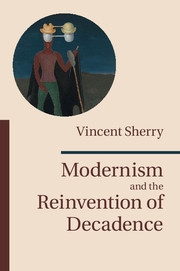Book contents
- Frontmatter
- Dedication
- Contents
- Acknowledgments
- Introduction The Codes of Decadence: Modernism and Its Discontents
- Chapter I The Time of Decadence
- Inter-chapter The Cultivation of Decay and the Prerogatives of Modernism
- Chapter II The Demonstrable Decadence of Modernist Novels
- Inter-chapter Imagism
- Chapter III Ezra Pound: 1906–1920
- Inter-Chapter Reforming Decadence: Late Romanticism, Modernism, and the Politics of Literary History
- Chapter IV T. S. Eliot: 1910–1922
- Afterword Barnes and Beckett, Petropi of the Twilight
- Notes
- Index
Inter-Chapter - Reforming Decadence: Late Romanticism, Modernism, and the Politics of Literary History
Published online by Cambridge University Press: 05 October 2014
- Frontmatter
- Dedication
- Contents
- Acknowledgments
- Introduction The Codes of Decadence: Modernism and Its Discontents
- Chapter I The Time of Decadence
- Inter-chapter The Cultivation of Decay and the Prerogatives of Modernism
- Chapter II The Demonstrable Decadence of Modernist Novels
- Inter-chapter Imagism
- Chapter III Ezra Pound: 1906–1920
- Inter-Chapter Reforming Decadence: Late Romanticism, Modernism, and the Politics of Literary History
- Chapter IV T. S. Eliot: 1910–1922
- Afterword Barnes and Beckett, Petropi of the Twilight
- Notes
- Index
Summary
“Poets are the unacknowledged legislators of the World.” Shelley’s dictum tends to be repeated most frequently to lay stress on the legislative force of literature. An equal emphasis should fall on the point that this law making is unacknowledged. This assertion does not constitute a plea for public recognition of poets. Rather, it is an indication that literature works its political effects indirectly, that is, through ways of happening that are characteristic of a literary imagination, say, through some enhanced fashioning of a common language. If this understanding sees the political power of poets, not as the result of their address to specific social issues, but instead as a function of their artistic making, another dictum from another age comes into view, but only as readily as it comes up as a problem in the politics of Shelley’s poetics. “Art for art’s sake”: the more art works to its own apparent purposes, following the logic of Shelley’s promise, the better it exerts its legislative effect. Yet the social contract drafted by poets in this formulation would seem to be written in invisible ink. How legible, let alone legislatorial, is it? What possible use could it be?
- Type
- Chapter
- Information
- Modernism and the Reinvention of Decadence , pp. 210 - 233Publisher: Cambridge University PressPrint publication year: 2014



